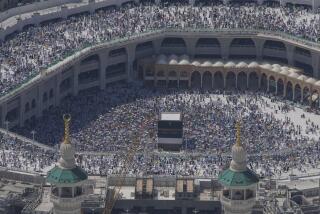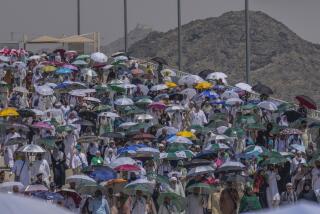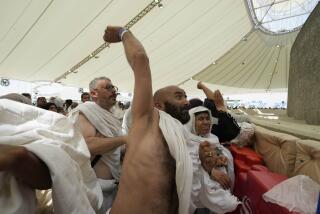Islam’s Call of Faith
- Share via
GARDEN GROVE — In the searing heat of the Saudi Arabian desert, often barefoot and in humble garb of white, the single largest gathering of humanity in the world begins Monday, when Muslims fulfilling their religious obligations make a pilgrimage to Mecca.
The pilgrimage, called a hajj, is one of the pillars of Islam and is required of every Muslim--health and finances permitting--at least once in a lifetime.
Muslim leaders estimate that Orange County has about 150,000 Muslims, and for months hundreds of them have been making spiritual and financial preparations to leave for Mecca.
“Imagine when you see the prophet’s footsteps, you say to yourself: ‘I’m standing at a place where Abraham also stood, where Noah has been, where Muhammad has been, where people 2,000 years ago once stood,’ ” said Alam Akhtar of Garden Grove.
*
A proper hajj is not just a trip to the desert. It is a reenactment of the struggle and sacrifice endured by Abraham, Hagar and their son, Ishmael, to whom Muslims trace their spiritual origins.
Akhtar, who left for Mecca with his mother, Raabia Basri, on Saturday, has done hajj once before. Basri, 51, has done hajj every year for the past eight years.
“Once I went there, that was it. I didn’t want to go anyplace else,” Basri said. “It is so beautiful. There is nothing like it.”
Once in Mecca, Muslims are forbidden to harm any living creature or even raise their voices in anger. During the six days of hajj, pilgrims circle a stone building they believe Abraham built.
They also retrace Hagar’s desperate steps as she searched for water for Ishmael, made a pilgrimage to Mt. Arafat and sacrificed an animal in remembrance of Abraham’s willingness to obey God’s command and sacrifice his son--who according to Islam was Ishmael, not Isaac.
After hajj, Muslims believe all their sins have been forgiven.
Thursday night, Dr. Mohammed Iqbal Ansari, 40, and his wife, Taskin, 36, were making last-minute preparations and finishing their packing to leave for hajj on Friday. Their excitement was palpable, and the couple spoke almost in a duet, finishing each other’s thoughts and sentences, coming to a point where they were speaking in unison.
While in Mecca, they said, it is the equality among the faithful--black and white, tall and short, rich and poor, master and servant--that reminds pilgrims that Islam does not distinguish between people.
*
The beauty of hajj, however, is also its greatest difficulty: millions of people lodging for a week in a desert kingdom. Because the observances and rituals occur at prescribed times, every act is a logistical challenge.
Those who have made the pilgrimage say the experience can bring dramatic changes to their everyday lives.
“I used to be extremely aggressive [and] was never reluctant to participate in a fight,” said Haitham “Danny” Bundakji, chairman of the board of the Islamic Society of Orange County. “Hajj softened me. Today, I use my hands for . . . handshakes and hugs.”
Bundakji is also a member of the Interfaith Council and a man noted in the Garden Grove community for his geniality and charity.
Bundakji made the pilgrimage in 1984 and 1994, but this year he is remaining at home. In the past few days he has been driving others to the airport and recalling his own trips.
“Arriving at Mecca, you could see the minarets from a distance, and you feel that your heart falls from its place,” he said. Caught off-guard by his own feelings, Bundakji’s eyes suddenly welled up with tears.
“I just felt awful not to be one of them,” he said, wiping his eyes. “As they were leaving, I thought that right now I’d like to be even a piece of their luggage.”
More to Read
Sign up for Essential California
The most important California stories and recommendations in your inbox every morning.
You may occasionally receive promotional content from the Los Angeles Times.













